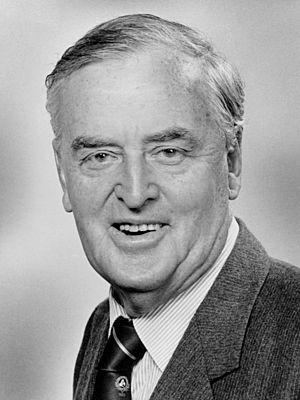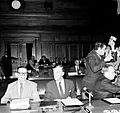Joh Bjelke-Petersen facts for kids
Quick facts for kids
Sir Joh Bjelke-Petersen
|
|||||||||||||||||||||||||||
|---|---|---|---|---|---|---|---|---|---|---|---|---|---|---|---|---|---|---|---|---|---|---|---|---|---|---|---|
 |
|||||||||||||||||||||||||||
| 31st Premier of Queensland Elections: 1969, 1972, 1974, 1977, 1980, 1983, 1986 |
|||||||||||||||||||||||||||
| In office 8 August 1968 – 1 December 1987 |
|||||||||||||||||||||||||||
| Monarch | Elizabeth II | ||||||||||||||||||||||||||
| Governor | Alan Mansfield Colin Hannah James Ramsay Walter Campbell |
||||||||||||||||||||||||||
| Deputy | Gordon Chalk William Knox Llew Edwards Bill Gunn |
||||||||||||||||||||||||||
| Preceded by | Gordon Chalk | ||||||||||||||||||||||||||
| Succeeded by | Mike Ahern | ||||||||||||||||||||||||||
| 20th Deputy Premier of Queensland | |||||||||||||||||||||||||||
| In office 1 August 1968 – 8 August 1968 |
|||||||||||||||||||||||||||
| Premier | Gordon Chalk | ||||||||||||||||||||||||||
| Preceded by | Gordon Chalk | ||||||||||||||||||||||||||
| Succeeded by | Gordon Chalk | ||||||||||||||||||||||||||
|
|||||||||||||||||||||||||||
|
|||||||||||||||||||||||||||
|
|||||||||||||||||||||||||||
| Personal details | |||||||||||||||||||||||||||
| Born |
Johannes Bjelke-Petersen
13 January 1911 Dannevirke, New Zealand |
||||||||||||||||||||||||||
| Died | 23 April 2005 (aged 94) Kingaroy, Queensland, Australia |
||||||||||||||||||||||||||
| Resting place | Kingaroy, Queensland, Australia | ||||||||||||||||||||||||||
| Citizenship | |||||||||||||||||||||||||||
| Nationality | Australian | ||||||||||||||||||||||||||
| Political party | Country | ||||||||||||||||||||||||||
| Spouse |
|
||||||||||||||||||||||||||
| Children | 4 | ||||||||||||||||||||||||||
| Relatives | Bjelke-Petersen family | ||||||||||||||||||||||||||
| Education | Taabinga State School | ||||||||||||||||||||||||||
| Alma mater | University of Queensland (LLB (Honorary)) | ||||||||||||||||||||||||||
| Occupation | |||||||||||||||||||||||||||
Sir Johannes Bjelke-Petersen KCMG (13 January 1911 – 23 April 2005) was an Australian conservative politician. He was the longest-serving and longest-lived Premier of Queensland, holding office from 1968 to 1987, during which time the state underwent considerable economic development. He has become one of the most well-known and controversial figures of 20th-century Australian politics because of his uncompromising conservatism (including his role in the downfall of the Whitlam federal government), political longevity, and the institutional corruption that became synonymous with his later leadership.
Bjelke-Petersen's Country (later National) Party controlled Queensland despite frequently receiving a smaller number of votes than the state's two other major parties, achieving the result through a notorious system of electoral malapportionment that resulted in rural votes having a greater value than those cast in city electorates. The effect earned Bjelke-Petersen the nickname of "the Hillbilly Dictator". Yet he was a highly popular figure among conservative voters and over the course of his 19 years as premier he tripled the number of people who voted for his party and doubled the party's percentage vote. After the Liberals pulled out of the coalition government in 1983, Bjelke-Petersen reduced his former partners to a mere eight seats in an election held later that year. In 1985 Bjelke-Petersen launched a campaign to move into federal politics to become prime minister, though the campaign was eventually aborted.
Bjelke-Petersen was a divisive premier and earned himself a reputation as a "law and order" politician with his repeated use of police force against street demonstrators and strongarm tactics with trade unions, leading to frequent descriptions of Queensland under his leadership as a police state. From 1987 his administration came under the scrutiny of a royal commission into police corruption and its links with state government ministers. Bjelke-Petersen was unable to recover from the series of damaging findings and after initially resisting a party vote that replaced him as leader, resigned from politics on 1 December 1987. Two of his state ministers, as well as the police commissioner Bjelke-Petersen had appointed and later knighted, were jailed for corruption offences and in 1991 Bjelke-Petersen, too, was tried for perjury over his evidence to the royal commission; the jury failed to reach a verdict as the jury foreman was a member of the Young Nationals, and Bjelke-Petersen was deemed too old to face a second trial.
Early life
Bjelke-Petersen was born in Dannevirke in the southern Hawke's Bay region of New Zealand, and lived in Waipukurau, a small town in Hawke's Bay. The Australian Bjelke-Petersen family are of Danish descent.
Bjelke-Petersen's parents were both Danish immigrants, and his father, Carl (known to the family as George), was a Lutheran pastor. In 1913 the family moved to Australia, establishing a farm, "Bethany", near Kingaroy in south-eastern Queensland.
The young Bjelke-Petersen suffered from polio, leaving him with a lifelong limp. The family was poor, and Carl Bjelke-Petersen was frequently in poor health. Bjelke-Petersen left formal schooling at age 14 to work with his mother on the farm, though he later enrolled in correspondence school and undertook a University of Queensland extension course on the "Art of Writing". He taught Sunday school, delivered sermons regularly in nearby towns and joined the Kingaroy debating society.
In 1933, Bjelke-Petersen began work land-clearing and peanut farming on the family's newly acquired second property. His efforts eventually allowed him to begin work as a contract land-clearer and to acquire further capital which he invested in farm equipment and natural resource exploration. He developed a technique for quickly clearing scrub by connecting a heavy anchor chain between two bulldozers. By the time he was 30, he was a prosperous farmer and businessman. Obtaining a pilot's licence early in his adult life, Bjelke-Petersen also started aerial spraying and grass seeding to further speed up pasture development in Queensland.
After failing in a 1944 plebiscite against the sitting member to gain Country Party endorsement in the state seat of Nanango, based on Kingaroy, Bjelke-Petersen was elected in 1946 to the Kingaroy Shire Council, where he developed a profile in the Country Party. With the support of local federal member and shire council chairman Sir Charles Adermann and Sir Frank Nicklin, he gained Country Party endorsement for Nanango and was elected a year later at age 36, going on to give regular radio talks and becoming secretary of the local Nationals branch. He would hold this seat, renamed Barambah in 1950, for the next 40 years. The Labor Party had held power in Queensland since 1932 and Bjelke-Petersen spent eleven years as an opposition member.
Death
Bjelke-Petersen died in St Aubyn's Hospital in Kingaroy in April 2005, aged 94, with his wife and family members by his side. He received a State Funeral, held in Kingaroy Town Hall, at which the then Prime Minister, John Howard, and Queensland Premier, Peter Beattie were speakers. Beattie, who had been sued by Bjelke-Petersen for defamation and was arrested during the 1971 Springbok tour protests, said: "I think too often in the adversarial nature of politics we forget that behind every leader, behind every politician, is indeed a family and we shouldn't forget that." As the funeral was taking place in Kingaroy, about 200 protesters gathered in Brisbane to "ensure that those who suffered under successive Bjelke-Petersen governments were not forgotten". Protest organiser Drew Hutton said "Queenslanders should remember what is described as a dark passage in the state's history." Bjelke-Petersen was buried "beside his trees that he planted and he nurtured and they grew" at the family property "Bethany" at Kingaroy.
The Bjelke-Petersen Dam in Moffatdale in the South Burnett Region is named after him.
Images for kids
-
Joh and Flo on their wedding day (31 May 1952)





